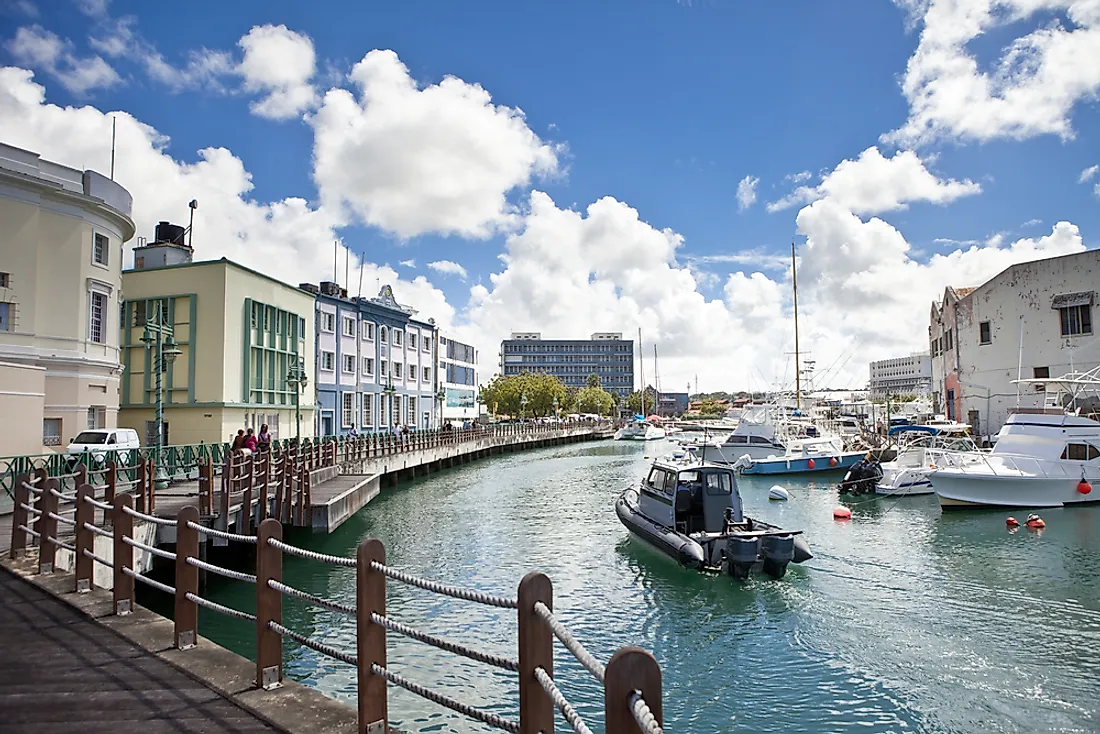An Introduction to the Island of Barbados: A Business Haven
A suitable business location, Barbados, is an enchanting island in the Caribbean and is celebrated for its pristine turquoise waters, picturesque white sandy beaches, and rich, vibrant culture. With its political stability and excellent governance, the island stands out as a thriving Caribbean nation. Barbados boasts a dynamic and diversified economy, with tourism, international business, and agriculture (mainly sugar cane cultivation and rum production) playing crucial roles.
English, the official language, is complemented by the island’s well-known warmth and hospitality, making it a premier destination for travelers and expatriates. Barbados offers many opportunities for expatriates, from career growth to a high quality of life.
Quality of Life in Barbados
Barbados, a safe and inclusive island, is widely regarded as having one of the highest standards of living in the Caribbean, earning it a prominent place on the global Human Development Index (HDI) for small island nations. The island offers many housing options, from luxurious beachfront villas to more affordable urban apartments catering to people of various income levels.
While the cost of living can be relatively high—mainly due to the reliance on imported goods and utility expenses—Barbadians enjoy an enviable quality of life. The island’s Public transportation is affordable and efficient, supported by a well-maintained road network that enhances mobility. In addition to its infrastructure, Barbados is known for its commitment to sustainability, safety, and inclusivity, creating a strong sense of community and contributing to the island’s allure as a place to live.
Understanding Personal Taxation in Barbados
Barbados operates a progressive tax system, where an individual’s tax rate is based on their income level. Residents are taxed on their worldwide income, while non-residents are only liable for income tax derived from within Barbados.
- Personal Income Tax: The individual income tax rate is structured progressively, beginning at 12.5% on the first BBD 50,000 (roughly USD 25,000) taxable income. For income exceeding this threshold, the rate rises to 28.5%.
- Allowances and Deductions: The Barbadian tax system allows for various deductions, including mortgage interest payments, contributions to registered retirement schemes, and medical expenses, which help reduce the taxable income of individuals.
- Value-Added Tax (VAT): A standard VAT of 17.5% applies to most goods and services, though certain essentials, such as basic food items, are exempt or zero-rated.
Barbados does not impose taxes on wealth, inheritance, or gifts, making it a particularly favorable jurisdiction for individuals seeking to optimize their financial portfolios.

Corporate Taxation in Barbados: Attracting Global Business
Barbados has established itself as a significant international business hub, particularly attractive for foreign investment due to its favorable tax regime.
- Corporate Tax Rates: Corporate tax rates in Barbados range from a deficient 1% to 5.5%, depending on the taxable income generated. International business companies (IBCs) and entities operating in special economic zones benefit from the lowest rates.
- Tax Incentives: Barbados offers various tax incentives to businesses, such as exemptions from import duties, stamp duties, and withholding taxes for qualifying ventures, further enhancing its appeal as a destination for international investors.
- Double Taxation Treaties: The island boasts an extensive network of double taxation treaties, ensuring that businesses and individuals engaged in cross-border trade and investments can avoid double taxation on their earnings, further boosting Barbados’ attractiveness for global business operations.
Key Sectors of the Barbadian Economy
Barbados’ economy is robust and diversified, with multiple industries contributing to its wealth and prosperity. While tourism often dominates as the island’s main economic driver, other sectors also play essential roles in the country’s growth.
- Tourism and Hospitality
Tourism remains the cornerstone of Barbados’ economy, with the hospitality industry being a significant employer. The sector generates substantial revenue through hotels, resorts, dining establishments, and recreational activities, making it indispensable to the nation’s GDP. - International Business and Financial Services
Barbados has emerged as a global leader in international business and financial services. The country’s favorable tax climate, highly educated workforce, and well-developed legal framework make it an attractive base for multinational companies and offshore businesses seeking to establish a presence in the region. - Agriculture and Agro-Processing
Though agriculture’s dominance in the national economy has diminished, it remains a vital contributor, mainly through sugar cane and rum production. The agro-processing industry is also expanding, with companies increasingly focusing on creating value-added products such as packaged foods and beverages for domestic and international markets. - Renewable Energy
In line with its commitment to sustainability, Barbados has been investing heavily in renewable energy. The government aims to achieve 100% renewable energy usage by 2030, opening up significant opportunities for businesses in solar and wind energy sectors. This commitment to sustainability inspires and ensures a healthier and greener future for the island and its residents. - Construction and Real Estate
The island’s thriving tourism sector, combined with an influx of expatriates and retirees, has created a demand for high-end villas, resorts, and residential developments. This, in turn, supports a growing construction industry, with both residential and commercial real estate experiencing significant growth.
Cost of Living and Inflation in Barbados
With its high standard of living, Barbados has a relatively high cost of living. Economic factors, especially reliance on imports, contribute to the rising costs.
- Housing
Rental prices vary depending on location. A one-bedroom apartment in the city’s heart can cost between BBD 1,800 and BBD 2,500 monthly. Properties in suburban areas are more affordable, offering cost-effective options for long-term living. - Food and Groceries
Because Barbados imports significant food, grocery prices are higher than in many other regions. Basic staples such as milk, bread, and fresh produce can be expensive. However, local markets offer fresher and more affordable produce, allowing residents to reduce their grocery expenses. - Utilities and Transportation
The cost of utilities such as electricity and water is among the highest in the Caribbean, owing to infrastructure constraints and limited natural resources. On the other hand, public transportation remains relatively inexpensive, with buses and minibusses being the primary means of travel for locals and tourists alike.
Taxes on Property, Services, and Sales in Barbados
Barbados finances its public services and infrastructure through taxes, including those on property, services, and goods.
- Property Tax
Property owners in Barbados are subject to an annual property tax based on the market value of their property. These rates typically range from 0.1% to 0.75%, depending on whether the property is residential, commercial, or vacant land. The government regularly adjusts these rates to align with its broader economic strategies. - Value-Added Tax (VAT)
A VAT of 17.5% is levied on most goods and services on the island, although exceptions exist for essential food items and some services. This tax is designed to ensure steady revenue for public services.
Exploring Business Entity Options in Barbados
In Barbados, entrepreneurs can choose from various business entities, each catering to different operational needs and scales. Whether starting a small local business or expanding into international markets, the island offers several options for setting up a business.
- Sole Proprietorship
The sole proprietorship is the simplest and most common business structure in Barbados, particularly for individual entrepreneurs. In this model, one person owns and operates the business, taking on all the responsibilities and liabilities. It is an ideal choice for small-scale operations with minimal legal requirements. - Partnership
Partnerships involve two or more individuals who pool resources and share business responsibilities. In Barbados, partnerships can be either general or limited. General partnerships involve shared liability among all partners, while limited partnerships allow some partners to limit their liability, making them attractive to risk-averse investors. - Corporations
Corporations are the preferred business structure for larger enterprises operating in Barbados. These can be either domestic or international in scope. International Business Companies (IBCs), in particular, benefit from a more favorable tax regime, making this structure especially attractive for companies focused on global operations. - Non-Profit Organizations
Non-profit entities in Barbados are set up to serve charitable, educational, or cultural purposes. These organizations are eligible for certain tax exemptions, provided they operate within the framework defined by the government. - Limited Liability Companies (LLC)
LLCs offer a balance of flexibility and limited liability for their owners. They are a popular choice for small to medium-sized businesses, as they combine the advantages of corporations with more straightforward operational processes.
Navigating the Licensing Process for Businesses in Barbados
Starting a business in Barbados requires obtaining the appropriate licenses and permits to ensure compliance with local regulations. Entrepreneurs must follow these steps to establish a legally operating business.
- Business Registration
All businesses in Barbados are required to register with the Corporate Affairs and Intellectual Property Office (CAIPO). This includes registering the business name, specifying the entity type, and providing details about shareholders. - Trade Licenses
Foreign-owned businesses must obtain a trade license from the Ministry of International Business and Industry. This license allows foreign entrepreneurs to operate legally within the country. - Industry-Specific Permits
Certain businesses, depending on their sector, may require additional specific permits. For example, food safety certifications are needed for restaurants, while tourism-related companies may need to secure tourism licenses to operate legally. - Tax Registration
All businesses must register with the Barbados Revenue Authority (BRA) to fulfill tax obligations. This includes registering for Value-Added Tax (VAT), corporate tax, and National Insurance Scheme (NIS) employee contributions.
Business Opportunities in Barbados for Expatriates
Barbados presents many business opportunities for expatriates looking to establish or expand their ventures on the island. The favorable business climate, the island’s natural beauty, and the growing economy make it an attractive destination for international entrepreneurs.
- Tourism-Based Ventures
As a leading Caribbean tourist destination, Barbados offers multiple opportunities in the tourism industry. Expats can explore niche markets such as boutique hotels, eco-tourism ventures, or cultural tourism experiences, capitalizing on the increasing number of visitors each year. - Renewable Energy Initiatives
Barbados is making significant strides toward sustainability, with the government encouraging foreign investment in renewable energy. Expats can explore opportunities in solar power, wind energy, and waste-to-energy projects, aligning with the island’s goal of transitioning to 100% renewable energy by 2030. - Technology and Innovation
The island’s ongoing push toward digital transformation provides significant opportunities in the tech sector. Expats with IT consulting, software development, and fintech expertise can find a burgeoning market in Barbados, which seeks to enhance its technological infrastructure. - Agriculture and Agro-Processing
Expats with experience in modern farming techniques or agro-processing can contribute to local food production and export growth. Agriculture remains essential to the Barbadian economy, particularly in sugar cane cultivation, rum production, and the growing agro-processing industry. - Real Estate Development
Barbados’ increasing demand for luxury residences and commercial properties provides lucrative opportunities for real estate developers. Expats can capitalize on this growing market by investing in or developing properties to meet the needs of affluent visitors, retirees, and expatriates.
Barbados offers a supportive environment for business growth, particularly for expatriates, who benefit from its political stability, skilled workforce, and investor-friendly policies.
Pathways to Citizenship for Expatriates in Barbados
Expats looking to make Barbados their long-term home have several avenues for residency and citizenship. These options offer flexibility and security for individuals settling on the island.
- Permanent Residency
Expats who have legally resided in Barbados for at least five years can apply for permanent residency. This status allows them to live and work in the country without work permits, providing greater freedom and stability for long-term residents. - Naturalization and Citizenship
After seven years of continuous residency in Barbados, expats can apply for Barbadian citizenship. This process involves demonstrating financial stability, a clean criminal record, and a commitment to the country. Successful applicants gain the right to vote, access to public services, and the ability to pass citizenship on to their children. - Special Entry and Reside Permit (SERP)
High-net-worth individuals who make significant investments in Barbados can apply for the Special Entry and Reside Permit (SERP). This permit grants long-term residency rights without requiring immediate citizenship, offering flexibility for individuals with substantial financial resources.
Barbados also supports dual citizenship, meaning that expats can retain their original nationality while becoming Barbadian citizens, which is an attractive feature for those looking to maintain connections with their home country.
Why Barbados Is an Attractive Location to Register a Business
Barbados has become a leading business hub in the Caribbean, offering numerous advantages for entrepreneurs, particularly those involved in international business. The country’s favorable tax regime, strategic location, and political stability make it an ideal destination for investment.
- Competitive Tax Framework
Barbados offers a highly competitive tax regime, with corporate tax rates ranging from 1% to 5.5%. This tax efficiency and an extensive network of double taxation treaties provide further relief for international businesses operating in Barbados. - Political and Economic Stability
Barbados benefits from a stable political environment and a well-regulated economy. The government’s commitment to maintaining a robust legal framework instills confidence in investors, ensuring a reliable environment for long-term business operations. - Strategic Geographic Location
Positioned between North and South America, Barbados is an ideal gateway for businesses seeking regional markets. The island’s proximity to major markets like the United States and Canada makes it an attractive base for international companies seeking to expand their reach. - Skilled Workforce
With a literacy rate exceeding 99%, Barbados has a highly educated and skilled workforce. This makes it an attractive destination for businesses requiring specialized talent, particularly in finance, technology, and services. - Efficient Business Processes
The government of Barbados has streamlined its business registration process, reducing bureaucratic barriers to entry. Incentives are available for businesses operating in sectors such as tourism, renewable energy, and financial services, making it easier for entrepreneurs to establish and grow their operations.
Steps to Register a Company in Barbados
Establishing a business in Barbados involves several straightforward steps. Entrepreneurs must follow a well-defined process to ensure their company is legally recognized and compliant with local regulations.
- Choosing a Business Name
The first step is to select a unique business name and verify its availability with the Corporate Affairs and Intellectual Property Office (CAIPO). - Deciding on a Business Structure
Entrepreneurs must choose the type of business entity they wish to establish. Whether it is a sole proprietorship, partnership, corporation, or LLC, the desired structure will determine the legal and tax responsibilities of the business. - Preparing Necessary Documents
Required documents for registration include the Articles of Incorporation, company bylaws, shareholder and director details, and proof of the business’s registered office address. - Business Registration with CAIPO
Submit the necessary documents to CAIPO, which will formalize the registration of your business, ensuring that it is legally recognized. - Tax Registration
After business registration, entrepreneurs must register with the Barbados Revenue Authority (BRA) to meet tax obligations, including VAT and corporate income tax registration. - Obtaining Sector-Specific Licenses
Entrepreneurs may need additional licenses or permits depending on the nature of the business. For instance, tourism and hospitality ventures require special permits, while food establishments must secure health and safety certifications.
Costs Involved in Registering a Business in Barbados
Setting up a business in Barbados entails various costs that vary according to the business structure and necessary permits. Below are the typical expenses entrepreneurs should anticipate:
- Business Registration Fees
For local companies, the registration fee begins at approximately BBD 750. For International Business Companies (IBCs) or foreign-owned entities, registration costs range from BBD 1,500 to BBD 2,500. - Annual Renewal and Maintenance Fees
Companies must pay annual fees for business renewals and submit financial statements. These costs typically range from BBD 500 to BBD 1,000. - Professional Services Fees
Legal and accounting services are often required to guide businesses through registration. Fees for these professional services can vary from BBD 1,000 to BBD 5,000, depending on the company’s complexity. - Licenses and Permits
Depending on the industry, sector-specific licenses can cost anywhere between BBD 500 and BBD 5,000 annually. - Additional Costs
Miscellaneous costs may include opening a corporate bank account, notarising documents, and securing a registered office address. These expenses contribute to the overall cost of doing business in Barbados.
Barbados’ International Relations
Barbados maintains strong diplomatic and economic relationships, positioning it as a thriving hub for international business.
- Double Taxation Treaties
With over 40 double taxation agreements (DTAs), Barbados ensures that businesses and individuals are not taxed twice on the same income, providing significant benefits to foreign investors from countries like the United States, Canada, the United Kingdom, and China. - Membership in Global Organizations
Barbados is an active member of CARICOM (Caribbean Community), the Commonwealth, and the Organization of American States (OAS). These memberships facilitate access to regional trade agreements and collaborative opportunities. - Economic Partnerships
Barbados has an Economic Partnership Agreement (EPA) with the European Union, allowing duty-free access to European markets. The country also fosters bilateral trade agreements with several Latin American and Caribbean nations.
Other Taxes in Barbados
In addition to corporate and income taxes, businesses and individuals in Barbados are subject to other taxes that contribute to the national revenue.
- National Insurance Contributions
Both employers and employees contribute to the National Insurance Scheme (NIS), which funds social security benefits like pensions, unemployment insurance, and more. - Stamp Duty
Stamp duty is applied to various legal documents, including property transactions and corporate filings, adding to the financial requirements for doing business. - Import Duties
Import taxes are levied on goods brought into Barbados. The rates vary depending on the type and value of the goods, influencing the overall cost of doing business.
Living in Barbados: Lifestyle, Weather, and Opportunities
Barbados offers an exceptional standard of living with its robust social security system, inviting climate, safety, and abundant opportunities for personal and professional growth.
- Social Security System
The National Insurance Scheme (NIS) in Barbados provides essential social security benefits such as pensions, unemployment benefits, and medical assistance. This system ensures residents have financial protection and stability. - Weather and Climate
Barbados enjoys a warm tropical climate with pleasant weather year-round, making it a favorite destination for those seeking a sunny environment. The island experiences occasional tropical showers, especially from June to November, but boasts over 3,000 hours of sunshine annually. - Safety and Security
Recognized as one of the safest Caribbean nations, Barbados has low crime rates, a strong police presence, and efficient emergency services. The government’s proactive disaster management measures help ensure safety during the hurricane season. - Passport and Global Mobility
Barbadian citizens enjoy visa-free access to over 160 countries, enhancing global mobility. The island’s passport ranks highly on the Henley Passport Index, allowing seamless travel and increased education, business, and leisure opportunities. - Education and Personal Growth
Barbados prioritizes education, offering free public schooling and access to higher education institutions like the University of the West Indies. The country’s diverse economy also provides ample career opportunities, while its rich cultural heritage fosters personal development through festivals and artistic pursuits.
In conclusion, Barbados is a beautiful island with a vibrant culture, stunning natural landscapes, and a thriving, stable environment for personal and professional growth, making it an ideal destination for expatriates, entrepreneurs, and anyone seeking a high-quality life.





